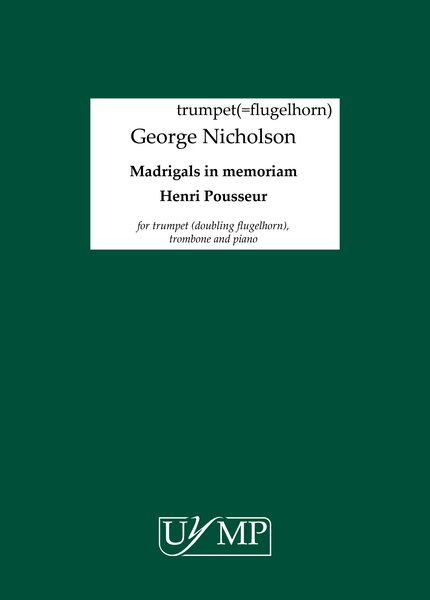The work of Belgian composer Henri Pousseur (1929-2009) is still comparatively unknown in Britain. However, his approach to harmony and to the music of the past has been a profound influence on my thinking for many years. I first came into personal contact with him as long ago as the mid 60s, a time when he was developing a kind of music that exploited a full and varied harmonic palette, one that engaged with extremes of consonance and dissonance and, rather than attempt to turn its back on the past, negotiated a new relationship with the music of earlier times. In the opera Votre Faust he collaborated with his librettist Michel Butor to create an all-encompassing – indeed encyclopaedic - vision of the Faust legend. In order to make this possible he had to develop the technical means of quoting, alluding to and assimilating aspects of the vast body of existing musical material relating to Faust, in much the same way that Butor's text drew on Goethe, Nerval, Marlowe and others. The musico-dramatic use of quotation in this context called for strategies of unification and transformation, and as a result Pousseur developed the means for creating a kind of 'time travelling' music in which direct quotation of extant musical sources did not necessarily have to play a part. Many of the later pieces do nonetheless go on alluding to important historical figures who preoccupied him – Schoenberg, Stravinsky, Dowland, Bach and Schumann. Dichterliebesreigntraum for instance – certainly a masterpiece, in my view - is a huge meditation on Schumann's Dichterliebe with the entire song cycle embedded in it!
I have borrowed the title of my piece from the set of three short chamber works that Pousseur composed between 1958 and 1962; beyond that 'madrigal' only serves to imply something of the contrapuntal activity and relative brevity of the original vocal form. Over the course of nine movements I explore a wide range of moods and colours, often alluding to archetypal musical motifs and figurations derived from the work of Schumann (especially Dichterliebe itself, the Fantasie op.17 and the Rhenish Symphony) and Bach (the chorale O Haupt voll Blut und Wunden, which he harmonised in at least five different ways). The eighth movement of my piece is effectively a quodlibet based on fragments of Dichterliebe (con)fused with the chorale melody and accompanied by a piano figuration derived from Schumann's op.17 (I like to think, Pousseur-style, that this music could have been composed by 'Schumbach'!). Pousseur was fond of referring to the final bars of his early Ode for string quartet as a musical flower. I wanted to conclude in a similar kind of way, and so the ninth of the madrigals is a predominantly tranquil and reflective piece featuring the flugelhorn, culminating in what I think of as a valedictory release of butterflies.
Madrigals in memoriam Henri Pousseur was written for Trio d'Art and completed in 2016.
© George Nicholson

